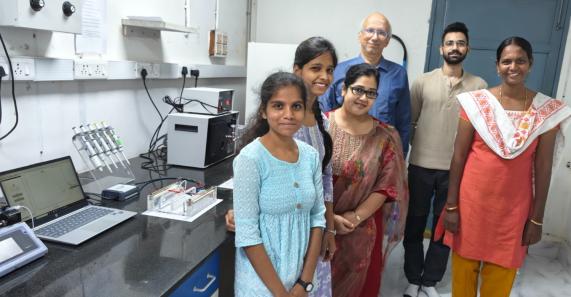
Using impedance analysis on bacterial samples, the chip provides antibiotics within hours, avoiding delays linked to culture techniques.

Researchers at the Indian Institute of Technology Madras have developed a chip-based device that uses electrochemical measurements to test bacterial resistance to antibiotics within three hours. An upgrade to conventional antibiotic susceptibility tests, which would take 48 to 72 hours because bacteria must be cultured and observed.
The device, called ε-µD, is built on screen-printed carbon electrodes embedded in a microfluidic chip. These electrodes act as sensors, detecting electrical property changes when bacteria are exposed to antibiotics. The system applies Electrochemical Impedance Spectroscopy (EIS), a method widely used in electronics for measuring current–voltage behaviour, adapted here to track bacterial growth.
As the conventional antimicrobial susceptibility testing (AST) methods depend on culturing bacteria, which can take two to three days. Doctors often prescribe broad-spectrum antibiotics, a practice that accelerates antimicrobial resistance. According to the World Health Organization, nearly five million deaths worldwide in 2019 were associated with bacterial AMR.
“We designed a nutrient solution that both sustains bacterial growth and enhances the sensitivity of the electrical signals,” said Prof. S. Pushpavanam, Department of Chemical Engineering, IIT Madras. “As bacteria multiply, the impedance signal changes, and our device measures these changes in real time.”
A signal-processing metric called the Normalised Impedance Signal (NIS) allows the device to differentiate resistant from non-resistant strains. The researchers tested the chip on E. coli and B. subtilis using two antibiotics—ampicillin, which kills bacteria, and tetracycline, which prevents growth. In both cases, the system identified susceptibility profiles within hours.
The team also ran trials with urine samples spiked with E. coli, confirming the device’s performance on clinically relevant specimens.
The work, published in Nature Scientific Reports, is undergoing clinical validation at IIT Madras Institute Hospital. Commercialisation is planned through Kaappon Analytics India Pvt. Ltd., a startup incubated in the IITM Research Park.








